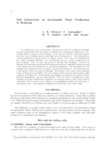Soil Constraints on Sustainable Plant Production in Malaysia
Tropical agriculture research series : proceedings of a symposium on tropical agriculture researches
| ISSN | 03889386 |
|---|---|
| NII recode ID (NCID) | AA00870529 |

Full text
tars24-_60-68.pdf1.76 MB
Tin-tailings, bris, peat, acid sulphate and steepland soils are considered unsuitable for agriculture unless they are properly reclaimed and subsequently ameliorated. Tintailings and bris soils are sand-textured. Both soils are infertile, intensely leached, have low water-holding capacity and high surface temperature. Their productivity could be enhanced by incorporation of organic matter. Peat soils are constrained by low acidity, nutrient deficiency, low soil-bearing capacity, woody composition and poor drainage. They are also susceptible to burning and shrinkage. Selection of suitable crops and appropriate land reclamation procedures, especially compaction and water table control are necessary for successful production. The limitations of acid sulphate soils include low pH, Al toxicity, and nutrient imbalance. The soils are prone to the adverse effect of excessive drainage. With proper water table control, dryland crops can be grown successfully. However, these problems are less severe under bouble cropping of wetland rice. In steeplands, the problems encountered are topsoil erosion, structure degradation, and non-sustainability. With the choice of suitable tree crops, adoption of proper conservation measures and fanning systems, these soils could be cultivated. Moreover the cooler climate in steep highlands enables the cultivation of subtropical crops. The marginal steeplands should be best kept under forest.
| Date of issued | |
|---|---|
| Creator | A. B. Othman Y. Aminuddin M. H. Ghulam H. Abd. Razak |
| Publisher | Japan International Research Center for Agricultural Sciences |
| Volume | 24 |
| spage | 60 |
| epage | 68 |
| Language | eng |
